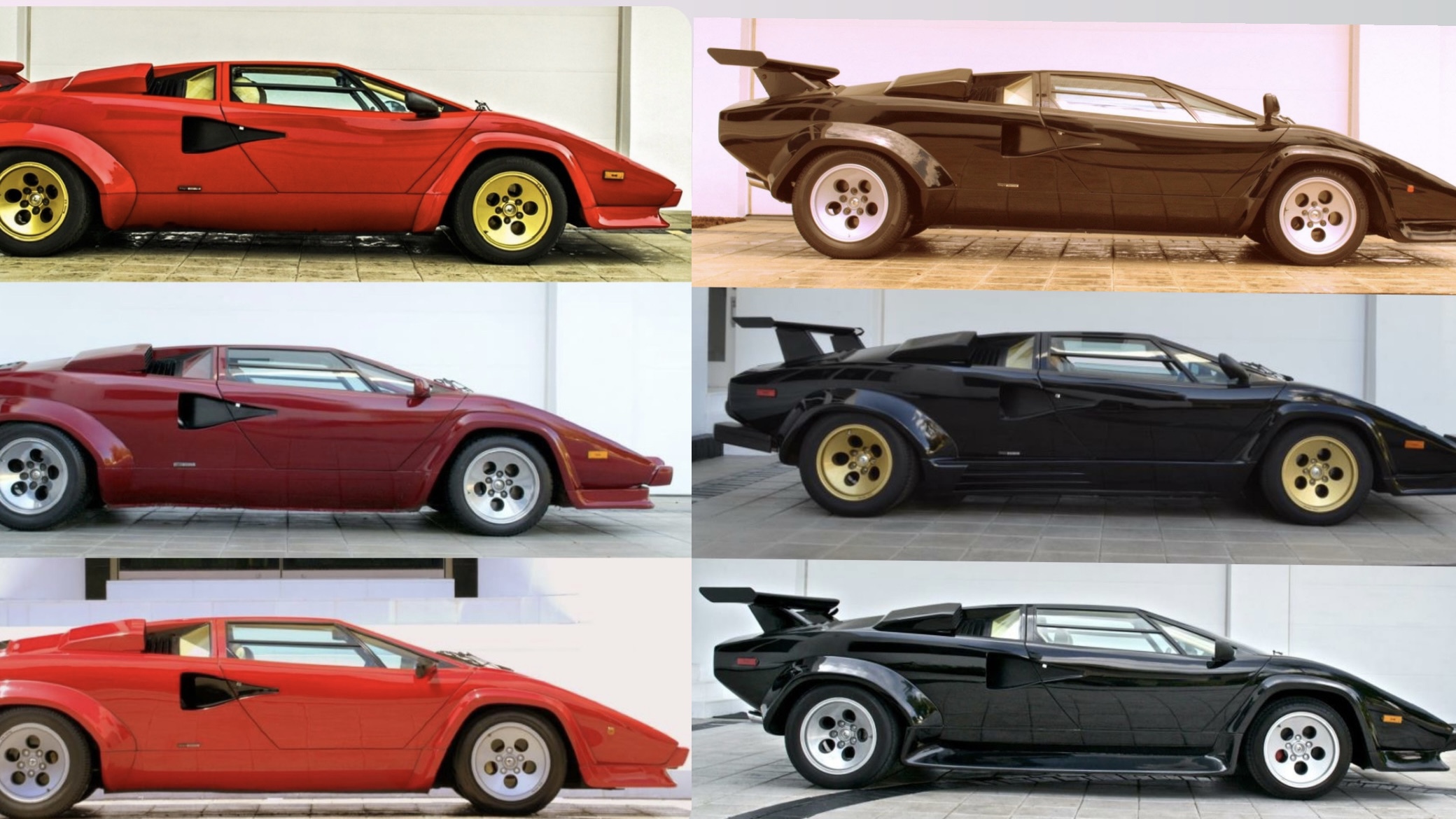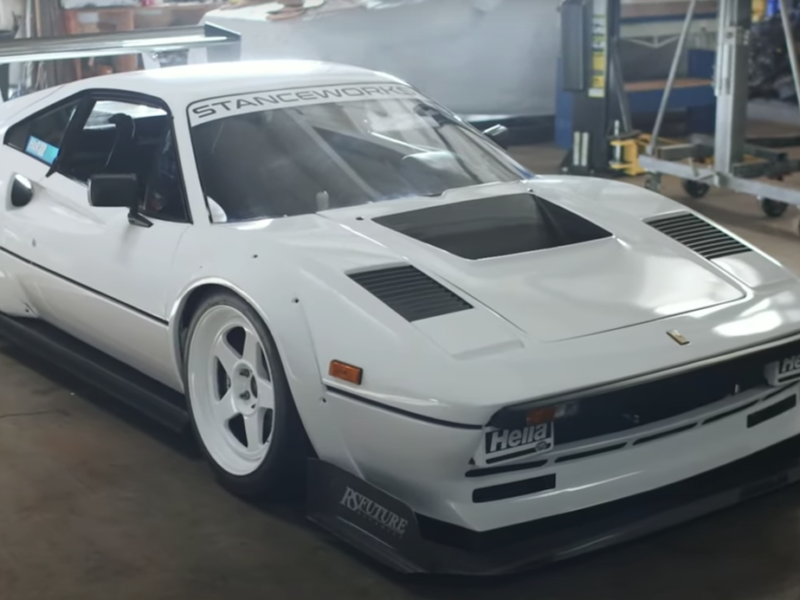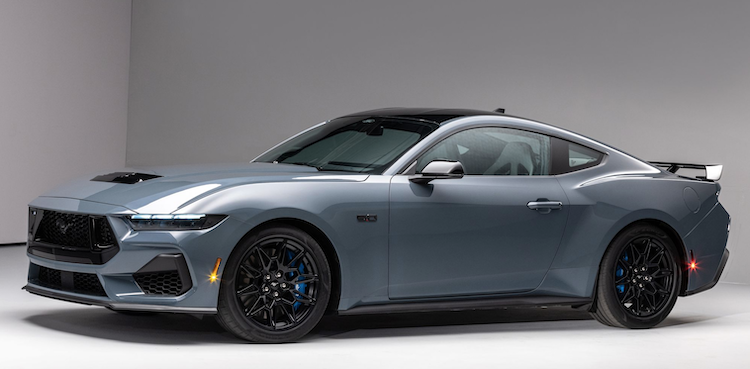The Lamborghini Countach is an “it” car. To paraphrase Billy Squier, everybody wants one. Who saw that coming? Back in the day, a Countach was a relatively inexpensive, brash and quirky choice for a car collector – especially when compared to just about anything Ferrari. And then something happened . . .
Lambo’s wedge-shaped poster child became the Baby Boomer’s real world pride and joy. GenX was similarly smitten. Prices didn’t just take off, they blasted off. A million dollar Countach? WTF? And yet, here we are. Even at its new stratospheric price point, there are Countaches and there are Countaches. Which one’s the Greatest Of All Time?
Here are all the Countach variants, the dates of production and the production numbers for each model (courtesy a commentator called 5000QV at lamborghinichat.com).
1. 1974-1977 Lamborghini Countach ~ 158 produced
2. 1985-1988 Lamborghini Countach QV DD ~ 380 produced
3. 1985-1988 Lamborghini Countach QV FI ~ 230 produced
4. 1978-1981 Lamborghini Countach S series 1 (Bravo wheels – low body) ~ 50 produced
5. 1978-1981 Lamborghini Countach S series 2 ~ 105 produced
6.1978-1981 Lamborghini Countach S series 3 ~ 82 produced
7. 1982-1985 Lamborghini Countach 5000 S ~ 321 produced
8. 1989-1990 25th Anniversary DD & FI ~ 658 produced
For the math averse, that’s 1,984 U.S. and Euro-spec cars in all. When it comes to value/price, production numbers matter (of course). Lambo made just 50 of the S series 1 – the lowest production number of all the Countach models released into the wild. With a caveat (below).
Rarity isn’t always the determining factor for desirability, but it’s certainly a major consideration. A model’s beauty may not be the primary consideration, but it runs a close second. I say – and the market agrees – that the early “lowbody” Countaches are the most visually appealing. With their small lower roof line and rounded bodies, they are the quintessential Countach.
In 1988, Lamborghini released the Countach 25th Anniversary model, tweaked by carbon fiber king Horacio Pagani. The Argentinian engineer took some of the ugly out of the five-mile-an-hour front and rear bumpers (added in 1984 to comply with U.S. safety regulations, called “toasters”). He also increased the car’s aerodynamic efficiency with revised mudguards, side skirts and spoilers.
The result is a better performing car – with too much “gingerbread” for collectors jonesing for the Countach’s original purity of form. In particular, buyers were offended by the side skirts. The aftermarket offered a solution: roundbody panels are under the Nastasi skirts and add flare caps, easily fix. Until the later cars, when the mod was a major PITA.
Newer models are always better to drive than older models: more power, better handling, etc.. But the Countach isn’t a daily driver. It’s a collector car. Later Countaches are more exhilarating (and safer) but less collectible than the OG Countach – even though roundbody modded post-’84 and post-’88 model cars restore the Countach to its former, minimalist glory.
As Farago pointed out, a lot of Lamborghini owners aren’t sticklers for originality. Which makes the market for the Countach a bit . . . confusing.
Which is worth more? A relatively underpowered all-original lowbody, roundbody pre-bumper Countach, or a later aerodynamic, hard-charging Countach made to look like a roundbody car? Number one! In fact, considering production numbers, the 1978-1981 Lamborghini Countach S series 1 is the Greatest Of All Time.
Or is it? There’s a wild card out there: the Lamborghini Downdraft Quattro Valvole U.S. (DDQV US). Lamborghini produced these cars between 1985 and 1987. (There’s a strange story behind their existence, which I’ll share in another post.) They’re the lowest of the low production, with a roundbody, ugly bumpers and six-stack downdraft Weber carburetors (455hp).
You could make the case that the ultra-rare DDQV US cars are the best of all possible Lamborghinis. Are they? Series 1 cars vs. downdraft roundbody cars. Who’s the king in 2025? As always, the market will decide. Meanwhile, check out this chart with my most recent price predictions [click on model name for images]. Watch this space for updates and more Countach history and analysis.
| Green : 1st Choice Orange: 2nd choice Factors | lp400 Periscope | Lp400S series1 series2 series3 | Lp5000 Carbed | 5000s AfterM BMW 2V-Fi System | 2V factory Fuely | DD QV USA | DD QV Euro | QV Fi USA | 25th ANV | 25th ANV DD |
| Price Predictions | $850k++ | $1.3M/s1 $800K/s2 $690K/s3 | $700+ | $550k+ | $700k+ | $1.4M | $900k | $620+ | $550 | $750 |
| Production Nubers | 157 | 50/s1 105/s2 82/s3 | 327 | <—- | “37“ | “13” | 380 | 220 | 657 | <—- |
| Body | Round Lean | Round Lean | Round Lean | Round | Round | Round | Flared | Flared | Flared | Flared |
| Wheels adds | Gold Silver | Gold Silver | ||||||||
| Bumpers | No | No | No | No | Small | No | No | Big | Big | N0 |
| Power | 325 | 325 | 455 | 455 | 425 | 455 | 455 | 420 | 455 | 455 |



A few issues here:
1). US Downdrafts had the ugly bumpers.
2). Most QVs (DD and FI) were round bodies.
3). The only factory flares were 1988.5 and later plus the test car for US homologation, which was updated by the factory in late 1987. Many pre 1988.5 cars had flares added, sometimes even by the dealership. It was desirable back then.
The RB downdraft will be the king especially in 2025. Euro or US.